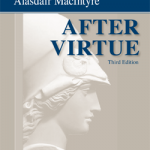
If my last post betrayed a certain frustration with this year’s experience at Acton U, it’s because I felt this year more strongly than last that many of the speakers were largely preaching to the choir while presenting their ideas as if they were new and surprising. I noticed it more strongly this year because, having already been through the experience once, I knew what to expect far more than I did last time.
I understand that one reason for this tone in the speakers is that Acton U makes an effort to bring in people who are not necessarily already “indoctrinated.” I have been made to feel very welcome at Acton both years, and my critical questions have always been treated with respect. I have also received a generous fellowship both years from the Oikonomia Network, followed up last year with a large package of books to further my indoctrination. (The Oikonomia Network, to be clear, is not part of the Acton Institute.) In short, Acton’s approach is to attract people interested in connecting faith with economic and social policy and then try to persuade them by reason that their methods are the best ones. That’s entirely fair, and it accounts for the fact that speakers often speak as if they are facing audiences who aren’t already persuaded–not all of us are, and they recognize that. But with all of this said, the fact is that the _majority_ of people in any session are going to agree already with the strongly “free-market” and “classically liberal” approach of the Institute.
This year, I attended the second part of John Bergsma’s “Property Rights in the Old Testament.” You can read my thoughts on the first half of the course, which dealt with the Torah, here. The second part covers the rest of the Old Testament. Like many people, at least those who have been exposed to standard Christian rhetoric about “social justice,” I expected to hear a lot about the minor prophets, and I was sure that Naboth would show up as well. Bergsma in fact spent most of his time talking about the historical and wisdom books, relegating the prophets to a few minutes at the end. He argued, in continuity with his interpretation of the Torah, that the Old Testament is hostile to a “command economy,” a term which he used to describe centralized Ancient Near Eastern societies (such as ancient Egypt) but which of course could also be taken to refer to socialism. He pointed out that the rebellion against Solomon was driven by resentment of high taxes and forced labor. (He also made a very insightful connection between Rehoboam’s foolish boast about making the people’s yoke heavier and Jesus’ promise that his yoke would be easy.) Naboth did indeed make an appearance, as an example of a king not respecting his subjects’ right to private (or more properly familial) property. (One of the strong points of Bergsma’s talk last year was his discussion of the connection between family and property in the Torah.)
When he did get to the prophetic denunciations of injustice against the poor, he pointed out that many of the abuses described involved the legal system and were carried out by people with access to governmental power. He suggested that this undercut attempts to use the prophets to support governmental welfare programs or regulations. In the Q & A, I challenged him on this, arguing that of course the rich were more likely to have access to political power, to which he responded, “Is it any different today?” I pressed the point that indeed this is the case today as well, and so both now and in the Bible you can’t make a sharp distinction between wealth and political power and thus get the wealthy off the hook, and he agreed.
He spent quite a bit of time on the Wisdom books, which he argued are often overlooked in discussions of wealth and poverty in the Bible. The positive picture of wealth found in Proverbs and Sirach, particularly the “virtuous woman” of Proverbs 31 (which he argued is the culmination of the whole book), counteracts the idea that wealth is necessarily a spiritually unhealthy thing. I would happily concede that these books are in fact the best suited of any Biblical books to support a “pro-wealth” interpretation of Christianity, but I read the rest of the Scriptural witness quite differently from Bergsma.
The most striking thing about his discussion of the Wisdom books, for me, was his claim that this positive picture of wealth is ignored. It certainly wasn’t news to me, and of course proponents of the “prosperity Gospel” make a lot of it. (Note: I’m not accusing Bergsma or anyone else at Acton of favoring the prosperity Gospel.) When I asked him about this (yes, I talked a lot in this session), he said that you don’t hear papers about this at SBL (the Society for Biblical Literature, the main academic conference for North American Biblical scholars). I’m sure that’s true.
But this remark illustrates the problem I identified at the beginning of this post. Bergsma presented as some kind of subversive novelty an idea that was surely fairly obvious to anyone approaching the Bible with anything like an Actonesque perspective. He’s quite right that it probably would be a subversive novelty at SBL. But he wasn’t giving this talk at SBL. He was, again, “preaching to the choir.”
The folks at Acton have ideas that need to be set up over against rival ideas in a free and open discussion. I don’t know if Bergsma has tried to present his views at SBL. I don’t know how he was received. But I wouldn’t be surprised if his kind of scholarship were, in fact, marginalized and discouraged in the mainstream academy. In fact, I’d be surprised if it weren’t. The ideological segregation of certain kinds of scholarship isn’t all the fault of the conservative counter-culture. Acton is gathering people in Grand Rapids every year for indoctrination in ideas that aren’t going to find a lot of hearing in the mainstream academy. I don’t blame them. I think they are doing it honorably and with intellectual integrity. But I long for a forum in which people of differing ideological perspectives can talk to each other, and it seems that our society has fewer and fewer of those. We all tend to preach to the choir–the left as well as the right. And we need to find ways of breaking out of that pattern.










